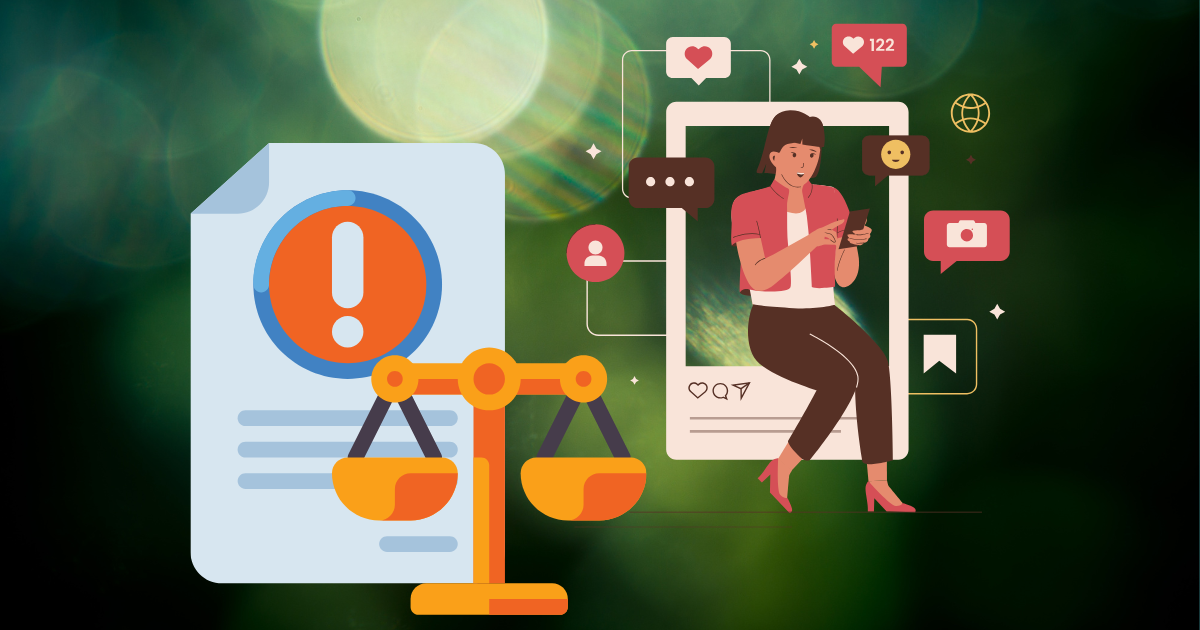Social media has transformed the way we communicate, interact, and consume information. However, as its influence has grown, so too have the legal challenges surrounding its use. From privacy violations to defamation cases, social media lawsuits have become a significant battleground, not just for individuals but for major companies as well. In this post, we will explore the top social media lawsuits shaping 2024 and provide insights on how to drive social media lawsuit success, whether you’re filing a claim or defending against one.
Top 5 Major Social Media Lawsuits You Need to Know in 2024
Several high-profile social media lawsuits are making headlines in 2024, as users, governments, and organizations seek to hold social platforms accountable. Here are the top 5 social media lawsuits to watch:
- Facebook’s Data Privacy Breach Lawsuit
- Facebook is once again facing legal scrutiny after allegations that it mishandled user data in violation of privacy laws. This ongoing social media lawsuit is part of a broader conversation about how big tech companies handle sensitive information.
- TikTok and User Data Collection
- TikTok is under fire for allegedly collecting and sharing user data without proper consent, particularly from minors. This data privacy lawsuit could have significant consequences for the platform’s global operations.
- Twitter’s Free Speech vs. Defamation Case
- Twitter is facing multiple defamation lawsuits, as users claim the platform did not remove harmful content that damaged their reputation. This case raises important questions about the balance between free speech and accountability on social media.
- Instagram’s Impact on Teen Mental Health
- Instagram is dealing with lawsuits from parents and advocacy groups who allege that the platform’s algorithms contribute to mental health issues in teenagers. The outcome of this social media lawsuit could impact how platforms handle user wellbeing.
- YouTube’s Copyright Infringement Lawsuit
- YouTube continues to be embroiled in legal battles over copyright infringement, with content creators accusing the platform of failing to protect their intellectual property. This case highlights ongoing legal challenges for creators on social media platforms.
These cases exemplify the growing tensions between social media companies and the public, as legal battles attempt to establish clearer regulations and responsibilities.
What Is a Social Media Lawsuit? Key Legal Issues Explained
A social media lawsuit is a legal dispute that arises due to the actions or policies of a social media platform, its users, or influencers. These lawsuits can involve a range of issues, from privacy violations to defamation, and can target both individuals and corporations. Common types of social media lawsuits include:
- Data Privacy Violations: When platforms misuse or fail to protect user data, leading to breaches or unauthorized sharing.
- Defamation and Libel: When false statements made on social media harm someone’s reputation.
- Intellectual Property Infringement: When copyrighted content is used or shared without permission on platforms like YouTube or Instagram.
- Invasion of Privacy: When individuals’ private information or images are shared publicly without their consent.
- Influencer Misconduct: When social media influencers engage in deceptive practices, such as misleading advertising.
Understanding the specific legal issues at play can help individuals and companies navigate the complexities of social media lawsuits and take appropriate action.
How to Drive a Social Media Lawsuit: Understanding the Legal Process
Filing or defending a social media lawsuit requires a thorough understanding of the legal process. Whether you’re seeking justice for a privacy breach or defamation, the following steps outline how to successfully drive your lawsuit:
- Gather Evidence
- Collect all relevant documentation, including screenshots, communication records, and witness statements. This evidence will be crucial in proving your claim or defense.
- Consult a Lawyer
- Given the complexity of social media legal battles, it’s important to consult with a lawyer who specializes in digital law or media law. They will guide you through the legal requirements and potential outcomes.
- File a Complaint
- The formal legal process begins when you file a complaint in court. The complaint should outline the basis of your lawsuit, the legal grounds, and the damages you are seeking.
- Discovery Process
- Both sides will gather information from each other through the discovery process. This is where evidence like emails, social media posts, and internal documents come into play.
- Negotiation or Trial
- In many cases, social media lawsuits are settled out of court. However, if a settlement cannot be reached, the case will go to trial where a judge or jury will decide the outcome.
Successfully navigating these steps is key to driving a social media lawsuit to a favorable resolution.
Social Media Data Privacy Lawsuits: Protecting User Information
One of the most common and significant types of social media lawsuits involves data privacy. Social media platforms collect vast amounts of personal information from users, often without clear consent. This has led to numerous lawsuits, particularly around:
- Unauthorized Data Sharing: Platforms like Facebook and TikTok have faced legal action for sharing user data with third parties without consent.
- Data Breaches: When social media companies fail to protect user data from hackers, leading to major breaches that expose sensitive information.
- Violation of Privacy Laws: Many lawsuits cite violations of privacy laws like the General Data Protection Regulation (GDPR) in Europe or the California Consumer Privacy Act (CCPA) in the U.S.
These cases are crucial for setting precedents on how much control users should have over their personal data and what platforms must do to protect it.
Social Media Defamation Lawsuits: Who Is Liable?
Social media defamation lawsuits are becoming increasingly common as individuals and businesses use these platforms to voice opinions that may cross legal boundaries. Defamation occurs when false statements are made publicly, causing harm to someone’s reputation. In the context of social media, this raises several questions:
- Who Is Liable?
- In most cases, the individual who made the defamatory statement is liable. However, social media platforms can also face legal action if they fail to remove defamatory content after being notified.
- How to Prove Defamation
- To succeed in a defamation lawsuit, the plaintiff must prove that the statement was false, harmful, and made with malice or negligence.
- Free Speech vs. Defamation
- One of the biggest challenges in these lawsuits is balancing the right to free speech with the harm caused by false statements. Courts must navigate this delicate issue carefully.
Defamation lawsuits can be complex, especially when involving high-profile individuals or companies. Understanding who is responsible is key to driving a social media defamation lawsuit successfully.
Drive Social Media Lawsuit Success: Key Factors to Win Your Case
Winning a social media lawsuit is no easy feat. Here are some factors that can improve your chances of success:
- Strong Evidence: The more concrete your evidence, the stronger your case. This includes any documentation, witness testimony, or expert analysis that supports your claim.
- Legal Expertise: Hiring a lawyer experienced in social media legal battles is critical. They will understand the nuances of digital law and how to present your case effectively.
- Clear Legal Grounds: Clearly defining the legal basis of your lawsuit—whether it’s defamation, privacy violation, or intellectual property infringement—will help guide the legal process and avoid unnecessary delays.
- Publicity Management: In high-profile social media lawsuits, managing public perception can be just as important as winning in court. Having a good public relations strategy can prevent further damage to your reputation.
By focusing on these key factors, plaintiffs can drive their social media lawsuits toward a successful outcome.
Legal Issues with Influencers: When Social Media Goes Wrong
Influencers are among the most visible figures on social media, and their actions often come under intense scrutiny. Unfortunately, this has led to a growing number of social media lawsuits involving influencers, with legal issues arising from:
- Misleading Advertising: Many influencers have been sued for failing to disclose paid promotions, violating advertising laws and misleading consumers.
- Privacy Violations: Influencers can also face legal challenges for sharing private information about others without consent, leading to invasion of privacy claims.
- Contract Disputes: Disagreements between influencers and the brands they promote can result in lawsuits over broken contracts or unmet obligations.
These cases highlight the legal responsibilities that come with having a large social media following and how influencers must navigate the legal pitfalls of their profession.
Ongoing Social Media Lawsuits in 2024: What to Watch For
As we move through 2024, several ongoing social media lawsuits are poised to make waves. These cases could change the way platforms operate and affect user behavior:
- Google and YouTube’s Copyright Battle
- This lawsuit could set a new standard for how platforms handle copyrighted content, particularly when it comes to monetization and distribution rights.
- Snapchat’s Privacy Class Action
- Snapchat is facing a class-action lawsuit over claims that it mishandled user data, violating privacy laws. The outcome of this case could reshape data protection standards for all social media companies.
- Meta’s Algorithmic Bias Lawsuit
- Facebook’s parent company, Meta, is dealing with a lawsuit that alleges its algorithms unfairly target certain demographic groups, leading to discriminatory outcomes.
These cases will likely have significant implications for the future of social media, influencing how platforms handle privacy, content, and user interactions.
Big Tech and Social Media Lawsuits: Accountability and Regulation
The rise of big tech lawsuits involving social media platforms like Facebook, Twitter, and TikTok has fueled debates about regulation and accountability. Governments are increasingly calling for stricter oversight of these platforms, particularly in areas like:
- Content Moderation: Lawsuits have questioned whether social media platforms should be held liable for the content they host, especially when it comes to hate speech, misinformation, or harmful content.
- Monopoly Concerns: Major companies like Meta and Google face antitrust lawsuits, alleging that they engage in monopolistic practices that stifle competition.
As these lawsuits progress, they may result in significant changes to the way social media platforms operate, potentially leading to new regulations aimed at protecting users and promoting fair competition.
For more exciting blogs, visit our homepage Magzineco.
FAQs About Social Media Lawsuits: Your Legal Questions Answered
- Can you sue a social media platform for defamation?
- Yes, but it’s often difficult to hold platforms liable due to legal protections under laws like Section 230 in the U.S., which shields them from being sued for user-generated content.
- What are the chances of winning a social media lawsuit?
- The success of a social media lawsuit depends on the strength of your evidence, the legal grounds for the case, and whether the case is settled out of court or goes to trial.
- Can influencers be sued for misleading advertising?
- Yes, influencers can face lawsuits if they fail to disclose paid partnerships or promote false or misleading claims.
- What are the most common types of social media lawsuits?
- Data privacy breaches, defamation, intellectual property infringement, and invasion of privacy are some of the most common lawsuits involving social media.
- How do social media companies defend against lawsuits?
- Social media companies often use legal protections like Section 230 to argue that they are not responsible for user content. They also focus on proving that they complied with relevant laws and regulations.
Conclusion
As social media continues to play an increasingly central role in our lives, legal challenges around privacy, defamation, and accountability are growing more complex. Understanding how to drive social media lawsuits to success requires not only a clear understanding of the legal landscape but also careful planning and strong legal support. Whether you’re an individual suing a platform or a company defending against claims, these cases are setting important precedents that will shape the future of social media for years to come.




